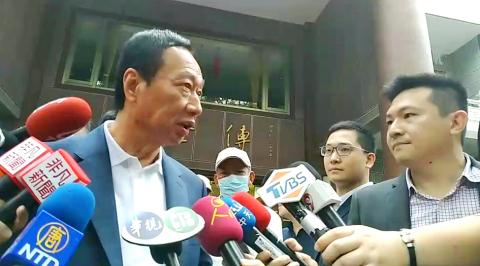Chinese Nationalist Party (KMT) presidential hopeful Terry Gou (郭台銘) yesterday swore off interviews with Want Want China Times Media Group-owned outlets, accusing them of abusing their press freedom privileges to generate false reports about him.
Gou — who founded Hon Hai Precision Industry Co — is among the leading figures in the race for the KMT’s presidential nomination.
He has accused Want Want reporters of working on behalf of China’s Taiwan Affairs Office.

Photo: Hung Ting-hung, Taipei Times
Gou wrote on Facebook that he would not back off and would not tolerate unfair and unjust “red media.”
“I cannot accept that certain media outlets can do whatever they please while hiding behind a fourth-estate mask and the protective umbrella of ‘media freedom’ while producing propaganda,” he wrote.
People have the right to know and media have an obligation and responsibility to report the truth, he said.
“However, Want Want reporters have distorted the truth. The company tried to manipulate public opinion by generating ‘anti-Gou’ fake news,” he wrote. “It has debased the values and dignity of media workers.”
Gou praised the founder of the Chinese-language China Times, Yu Chi-chung (余紀忠), saying that he was among those who had advocated for Taiwan’s democratization.
“However, three decades later, as Hong Kongers protest China’s proposed extradition treaty, reports about the 1 million-plus protesters on the streets was kept secret by Want Want Group media, who did not want people to know what was happening,” he wrote.
“The news was hidden in a corner of the [Want Want-owned] newspaper,” Gou wrote.
“If Yu had seen this at Want Want media, he would have been very ashamed,” he wrote.
Freedom and democracy are the most treasured assets that the Republic of China has,” he wrote. “If Want Want Group media do not reflect on this and change their ways, they will be repudiated and boycotted.”
Want Want had not commented as of press time last night.

The High Prosecutors’ Office yesterday withdrew an appeal against the acquittal of a former bank manager 22 years after his death, marking Taiwan’s first instance of prosecutors rendering posthumous justice to a wrongfully convicted defendant. Chu Ching-en (諸慶恩) — formerly a manager at the Taipei branch of BNP Paribas — was in 1999 accused by Weng Mao-chung (翁茂鍾), then-president of Chia Her Industrial Co, of forging a request for a fixed deposit of US$10 million by I-Hwa Industrial Co, a subsidiary of Chia Her, which was used as collateral. Chu was ruled not guilty in the first trial, but was found guilty

DEADLOCK: As the commission is unable to forum a quorum to review license renewal applications, the channel operators are not at fault and can air past their license date The National Communications Commission (NCC) yesterday said that the Public Television Service (PTS) and 36 other television and radio broadcasters could continue airing, despite the commission’s inability to meet a quorum to review their license renewal applications. The licenses of PTS and the other channels are set to expire between this month and June. The National Communications Commission Organization Act (國家通訊傳播委員會組織法) stipulates that the commission must meet the mandated quorum of four to hold a valid meeting. The seven-member commission currently has only three commissioners. “We have informed the channel operators of the progress we have made in reviewing their license renewal applications, and

Taiwan People’s Party (TPP) Chairman Huang Kuo-chang (黃國昌) yesterday appealed to the authorities to release former Taipei mayor Ko Wen-je (柯文哲) from pretrial detention amid conflicting reports about his health. The TPP at a news conference on Thursday said that Ko should be released to a hospital for treatment, adding that he has blood in his urine and had spells of pain and nausea followed by vomiting over the past three months. Hsieh Yen-yau (謝炎堯), a retired professor of internal medicine and Ko’s former teacher, said that Ko’s symptoms aligned with gallstones, kidney inflammation and potentially dangerous heart conditions. Ko, charged with

Taiwan-based publisher Li Yanhe (李延賀) has been sentenced to three years in prison, fined 50,000 yuan (US$6,890) in personal assets and deprived political rights for one year for “inciting secession” in China, China's Taiwan Affairs Office spokesman Chen Binhua (陳斌華) said today. The Shanghai First Intermediate People’s Court announced the verdict on Feb. 17, Chen said. The trial was conducted lawfully, and in an open and fair manner, he said, adding that the verdict has since come into legal effect. The defendant reportedly admitted guilt and would appeal within the statutory appeal period, he said, adding that the defendant and his family have